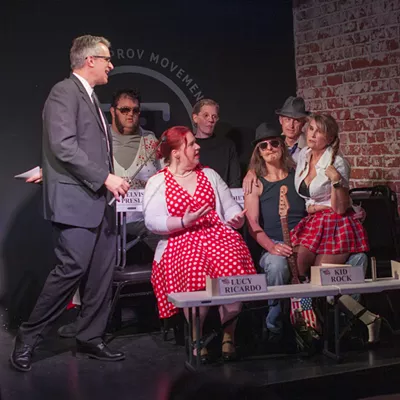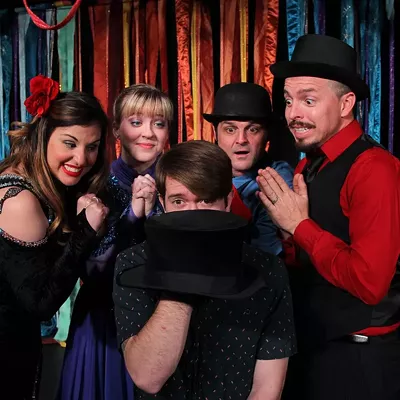How do we get to the truth of a situation? Is it merely an examination of the facts? Do our emotional filters help or hinder our search for the truth? Stephen Colbert's gut-trusting "truthiness" aside, is there a role for heart and instinct in such an inquiry?
Two stage productions that opened last weekend assert that there's more to the truth than just the facts that are easiest to present. Working one's way to the "true" facts is the subject of the classic Twelve Angry Jurors, getting a good community-theater treatment from the St. Francis in the Foothills Theatre Collaborative. A more sophisticated investigation of the issue is Lanford Wilson's Lemon Sky, a memory play presented by Live Theatre Workshop.
In Lemon Sky, a young playwright in his late-20s is trying to make sense out of an episode in his life some 10 years earlier. Fresh out of high school, Alan had traveled from Omaha to San Diego to live with his long-estranged father and his new family. Initially, it was an idyllic situation, but within six months, everything fell apart. Now, Alan is working out some way for himself to understand what happened, while also developing a method to help an audience understand it, too.
Multiple-character plays dominated by a narrator usually fail, because a character shouldn't be telling us what to think and feel; it's the playwright's job to show, not tell. Yet in Lemon Sky, Wilson pulls off this trick honorably. At the beginning, Alan acknowledges that he's not the most reliable of narrators, and what he's doing is manipulating memory to figure out how he feels, not manipulating us to create box-office buzz.
In this production, directed by Glen Coffman, Alan addresses the audience as his adult self, then slips into teenage character to re-enact key scenes from his stay with his dad. Alan will interrupt a scene to comment on it, and the other characters may or may not listen to his comments and offer remarks of their own. It sounds artificial, but in the end, Alan and the other characters have every bit as much at stake—maybe even more—as those in a conventional presentation.
Some of Wilson's later works, notably Fifth of July and Talley's Folly, can be emotionally glib, but Lemon Sky seems much more sincere and less writerly, despite its theatrical conceits. And there's been no recent performance in town more sincere and subtly nuanced than Christopher Johnson's as Alan. Though he's not above holding a few facts back, he's basically a good kid who initially thinks he's fallen into the kind of big and not entirely organized family he's always wanted, and his joys and disappointments through the course of this story always ring true.
Roger Owen brings surprising dimensions to Doug, the father, a character who turns out to have interests that do neither him nor his family any good. Doug could come off as nothing more than an unsavory villain, but Owen creates such a complicated character that in the end, we wonder if he was really as bad as Alan reluctantly recalls.
Doug's current wife, Ronnie, is comparatively flat. Kristi Loera at least doesn't play her as the dumb blond the script initially implies, but neither does she manage to suggest that Ronnie is much more than a well-meaning pushover. It's a valid choice, but not the only one.
Doug's new family includes two young sons, nicely played by Ryan Callie and Cole Gregory, and two teenage foster daughters. Marina Jarrette doesn't have much to do as the less-troubled of the two, but Allegra Breedlove manages to make her character much, much more than the stock bad girl.
Stock characters inhabit Reginald Rose's Twelve Angry Jurors, but that's the intention. Rose's 1950s script slices into a cross-section of urban America, and roasts this little strip of humanity in a stifling New York jury room. Eleven of the characters expect to be released within minutes, for the murder trial seemed straightforward. But one of the jurors—they have no names, and this one is No. 8—feels that some things don't add up. Can he spread his reasonable doubt through the room and prevent the conviction of a possibly innocent young man?
Though it was written for golden-age TV and initially populated exclusively with male jurors (it was originally called Twelve Angry Men, and was made into a movie with Henry Fonda), the show has been updated to the 1990s by Sherman Sergel, and given more contemporary language and a more diverse cast of characters—men and women, white and black and brown, gay and straight, young and old, white-collar and blue-collar. The device may be obvious, and most of the characters' conflicts are predictable, yet the story remains taut, and the authors have a moral and dramatic integrity that count for a lot.
Director Robert Encila has assembled a cast of varied experience, but he's done a fine job of establishing a natural dynamic among them. The most critical roles are handled very well—Steve Wood as the voice of reason, Marren Sanders as an angry racist, Todd Luethjohann as a logical businessman, Raymond Thomas as a bully, and Jacob Brown as a used-car salesman—and all of the rest come off no less than honorably.
Both of these productions benefit from something necessary to all truth commissions and stage shows: a simple, inherent honesty.










